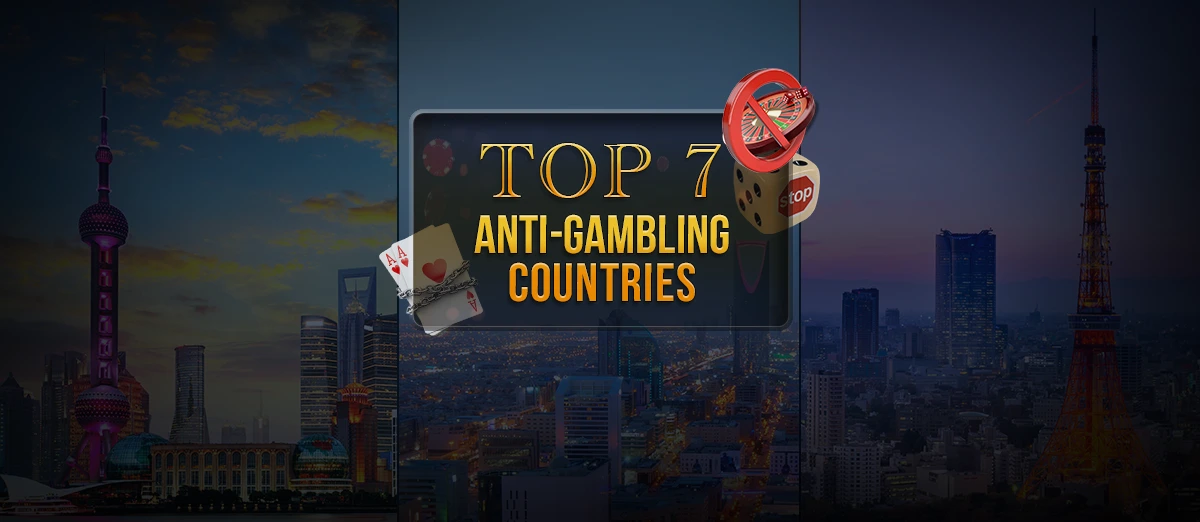Driving Forces Behind the World’s Strictest Anti-Gambling Nations

Gambling, which is without a doubt one of the most popular forms of entertainment worldwide as well as being one of the most lucrative industries. This pastime however is heavily restricted or even banned in some countries. Cultural, religious, and social factors often influence these restrictions, shaping the local perception of gambling. As a result, below, we have explored some of the biggest anti-gambling countries in the world, understand their policies, and examine the cultural implications of these gambling regulation and even prohibitions in some cases.
1. Saudi Arabia
Saudi Arabia has some of the strictest anti-gambling laws globally, influenced by Islamic teachings, which consider gambling (or "Maisir") haram or forbidden. The Saudi government enforces these laws rigorously, with severe penalties for those caught participating in or facilitating gambling activities.
Despite the considerable potential, despite the country starting to establish itself as a significant hub for e-gaming after the injection of billions of dollar’s worth of investment, any form of gambling remains strictly prohibited.
Sheikh Abdulaziz Al-Sheikh, a senior religious leader in Saudi Arabia, stated, "Gambling is a sin that leads to many other social problems. Our laws are designed to protect our citizens from these harms and maintain the moral fabric of our society."
The cultural implications of these laws are profound. In Saudi society, gambling is not just illegal but also socially stigmatised. The focus on religious adherence and moral conduct means that gambling, viewed as a vice, is shunned. Consequently, gambling activities are virtually non-existent, and the entertainment landscape is shaped by other forms of social engagement that align with Islamic values.
2. China
China's stance on gambling is complex. While the government bans gambling on the mainland, it allows it in specific regions like Macau and Hong Kong. Macau, often called the "Gambling Capital of the World," operates under a different legal framework from mainland China and has become a significant hub for casino tourism.
On the mainland, gambling is strictly prohibited, and the government actively cracks down on illegal gambling activities. This ban extends to online gambling as well, with strict regulations in place to block access to gambling websites.
"The Chinese government views gambling as a social ill that can lead to corruption and financial instability. Our policies aim to safeguard our country's economic well-being and social order." said Li Wei, a spokesperson for the Chinese Ministry of Public Security.
The cultural implications in China are dual-faceted. Gambling is a significant economic driver in regions like Macau and an accepted social activity. However, on the mainland, gambling is primarily seen as harmful and is culturally frowned upon. This dichotomy highlights the diverse attitudes towards gambling within different parts of the country.
3. Iran
Iran, like Saudi Arabia, has a strong religious basis for its anti-gambling stance. Islamic law, which forms the foundation of Iran's legal system, strictly prohibits gambling. The government enforces these laws with significant penalties for those caught gambling.
Ayatollah Ali Khamenei, the Supreme Leader of Iran, has emphasised the moral dangers of gambling, stating, "Gambling erodes the values of hard work and honesty, leading to social decay. We must protect our society from such destructive practices."
Culturally, gambling is seen as a significant moral failing in Iran. The focus on Islamic values means that activities considered haram are heavily stigmatised. This cultural perspective ensures that gambling remains a taboo subject, with little to no presence in everyday life.
4. North Korea
North Korea maintains an almost complete ban on gambling for its citizens, reflecting the government's control over all aspects of life. However, the country allows gambling for foreign tourists in specially designated areas, such as certain hotels in Pyongyang.
The North Korean government views gambling as a capitalist vice that could undermine the socialist principles upon which the country is founded. Kim Jong Un has made clear that gambling is considered a threat to the social order and is strictly controlled to prevent any influence on North Korean citizens.
For North Koreans, gambling is not only illegal but also inconceivable due to the country's rigid social structure and intense government oversight. The cultural implications are significant, as the prohibition reinforces the government's narrative of protecting its people from harmful outside influences.
5. Japan
Japan has a unique approach to gambling. While many forms of gambling are illegal, the country has exceptions for specific activities such as pachinko, a popular game similar to pinball. Pachinko parlours are widespread and technically operate within the law by awarding non-monetary prizes that can be exchanged for cash at separate establishments.
The Japanese government has recently taken steps to legalise certain forms of gambling, such as integrated resort casinos, to boost tourism and economic growth. Despite these changes, there remains significant cultural resistance to gambling, driven by concerns about addiction and social harm.
"Japan is cautious about expanding gambling due to its potential negative impact on society," explained Takashi Kiso, CEO of the International Casino Institute. "The government is trying to balance economic benefits with social responsibilities."
Culturally, gambling is often viewed with suspicion in Japan. The rise of legal casinos has sparked debates about the potential for increased gambling addiction and crime. This cultural tension highlights Japan's challenges as it navigates the complex landscape of gambling regulation.
6. India
India's approach to gambling is diverse and varies significantly by state. While gambling is primarily prohibited in most of the country, certain states like Goa and Sikkim have legalised casinos and other forms of gambling to attract tourism.
On a national level, the Public Gambling Act of 1867 prohibits most forms of gambling, though this law is outdated and inconsistently enforced. The emergence of online gambling in India has further complicated the regulatory landscape, with debates ongoing about how to modernise gambling laws.
Rajesh Chopra, an All India Gaming Federation advisor, noted, "India's gambling laws need reform. There is a growing recognition that regulated gambling could generate significant revenue and reduce illegal activities."
Culturally, gambling in India is a complex issue. While it is traditionally frowned upon and associated with moral and social issues, there are also cultural practices like betting on cricket and card games during festivals.
7. Norway
Norway has some of the strictest gambling regulations in Europe. The government monopolises all gambling activities through state-owned entities, with profits directed towards social causes. Online gambling is heavily restricted, with only a few approved operators allowed to offer services to Norwegian citizens.
The Norwegian government views these restrictions as necessary to prevent gambling addiction and protect consumers. "Our goal is to ensure a safe and responsible gambling environment. By controlling the market, we can better manage the risks associated with gambling." said Atle Hamar, Director of the Norwegian Gaming Authority.
Culturally, gambling is not a significant part of Norwegian life. The strict regulations and government monopoly mean that there is limited availability of gambling options, which contributes to lower rates of gambling participation and addiction.

Cultural Roots of Anti-Gambling Laws
The strict anti-gambling laws in countries like Saudi Arabia, China, Iran, North Korea, Japan, India, and Norway are deeply rooted in cultural, religious, and social values. These laws reflect a desire to protect citizens from the potential harms of gambling, such as addiction, financial instability, and moral decay.
In Saudi Arabia and Iran, religious beliefs play a crucial role in shaping anti-gambling policies. In China and North Korea, the focus is on maintaining social order and economic stability. Japan and India grapple with balancing cultural concerns and financial benefits, while Norway's approach emphasises consumer protection and social welfare.
Understanding these cultural implications is essential for comprehending why these countries maintain strict anti-gambling laws. As global attitudes towards gambling continue to evolve, these nations face ongoing challenges in balancing tradition, regulation, and the changing dynamics of the modern world.
The New Frontier for Global Gambling
As global attitudes toward gambling continue to shift, several regions are emerging as potential new gambling jurisdictions.
One such region is Brazil. With its large population and vibrant tourism industry, Brazil has significant potential to become a major player in the global gambling market. Recent legislative efforts indicate a shift towards a more regulated and open gambling environment. As a result, the country could see a surge in investment from international casino operators. Lawmakers are considering comprehensive frameworks to ensure gambling activities are conducted fairly and transparently. As such, Brazil could become a hotspot for the LatAm gambling market, attracting tourists and boosting the economy.
Kenya is another region exploring the potential of legalised gambling. The country has a burgeoning market for sports betting and online casinos, driven by increasing internet penetration and a young, tech-savvy population. The government is developing regulatory frameworks to ensure fair play and protect consumers. Ultimately, Kenya could position itself as a leading gambling destination in Africa, benefiting from increased tourism and foreign investment.
In Europe, Ukraine is one of the countries exploring the legalisation of gambling. The government has passed laws to regulate the industry and attract foreign investments. As such, Ukraine aims to develop a robust gambling market that will contribute to economic growth and job creation. The country's strategic location and growing tourism sector make it an attractive destination for gambling operators.
Ultimately, these regions reflect a global trend toward legalising and regulating gambling. By balancing economic opportunities with social responsibilities, new jurisdictions can create vibrant, competitive markets that benefit their economies and citizens.





Review this Blog
Leave a Comment
User Comments
comments for Driving Forces Behind the World’s Strictest Anti-Gambling Nations